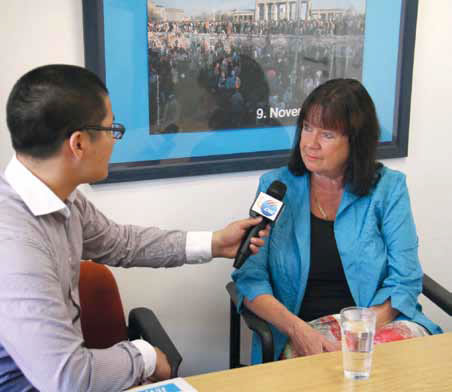Xinhua Interviews Helga Zepp-LaRouche
October 2014

EIRNS/Christopher Lewis
Helga Zepp-LaRouche’s interview in Xinhua and other Chinese media on her concept of the New Silk Road is now circulating widely in China. Here, Zepp-LaRouche in an earlier interview with Xinhua, last May. |
Oct. 18—Xinhua, the official news agency of the People’s Republic of China, on Oct. 15 translated and published on its website an exchange with Schiller Institute President Helga Zepp-LaRouche, as Premier Li Keqiang finished his historic three-day visit to Germany. Zepp-LaRouche had recently returned from a trip to China, where she is known for her advocacy of the New Silk Road. Xinhau published four of her replies to reporter Zhang Yi Zhang’s questions submitted to her.
Xinhua: Premier Li Keqiang and Chancellor Angela Merkel had decided that 2015 would be the Year of China-Germany Innovative Cooperation. Right now, both China and Germany are faced with challenges and opportunities of urbanization, industrialization, informatization, and agricultural modernization, in which processes innovative technology is needed. What do you see in the future of China-Germany cooperation in innovation?
Helga Zepp-LaRouche: The German economy is experiencing presently the impact of several factors, the effects of the exit from nuclear energy, without having an adaquate replacement, the effects of the crisis in the Euro zone, and the effect of the sanctions against Russia. Therefore, the common focus between China and Germany on innovation is all the more important, especially in areas such as space science and fusion technology and other areas of high energy flux density, since economic slowdowns can best be overcome by qualitative jumps in the productivity of the production process.
The good thing is that both China and Germany have realized at different times economic miracles, which astounded the world, and both of these miracles were based on very similiar ecoconmic principles. It would only be to the advantage of the entire world, that the China-Germany Innovative Cooperation Year 2015 will lead to a new scientific renaissance, and evokes an explosion of creativity, especially among the young generation.
Xinhua: It is said by politicians and academics of both our countries that well-developed political and economic ties between China and Germany give great impetus to deepening the ties between China and Europe. Mrs. LaRouche, what do you think of this comment? How do you view Germany’s role as a connection between China and Europe? And what can the Hamburg Summit do to enchance that connection?
Zepp-LaRouche: The great German philosopher Gottfried Leibniz, who was very fond of China, always said that Europe and China were the two advanced civilizations at two ends of the Eurasian continent, and that if they were to join hands and work together, they could uplift all the countries in between. That is exactly what the New Silk Road- and the Maritime Silk Road-conception will facilitate. It is obvoius, that the more people in Europe encounter the tremendous sense of optimism, that emenates from the transformation in China during the last 30 years, the more grows the hope that also in Europe there will develop a similiar optimism again, which is presently lacking. I also think, that Europe can only benefit from the study of Confucian philosphy and principles, which by the way, are very similiar to Leibnizian ideas. The Hamburg summit was an important step in that direction.
Xinhua: In 2010, China and Germany agreed to establish a governmental consultation mechanism between China and Germany, which is of highest level and largest scale between our countries, and can be seen as a “joint cabinet meeting” between the two countries. Mrs. LaRouche, what do you think of the role of this governmental consultation mechanism in the world today? How do you evaluate this consultation mechanism, and how does it help improve and deepen Sino-German relations? What can we gain from the mechanism?
Zepp-LaRouche: I think this mechanism is extremely important in light of the strategic dangers today, some of which I mentioned in the beginning. Germany expressed, that it wants China to take more international responisbility. So China should not hesitate to express its view fully and honestly. Since both China and Germany are countries whose real self-interest is to maintain world peace, they should be as creative as possible, to work together to this end.
Xinhua: Each being an important power in Asia and Europe, China and Germany play major roles in maintaining peace and stability in the region and the world. In your opinion, what should the two sides do to deepen bilateral and multilateral strategic cooperation in diplomatic and security areas, so as to better play our parts?
Zepp-LaRouche: They should immediately make a proposal that Europe, the U.S., and the BRICS countries must work together to deal with the ISIS threat. Only if all these countries work together, will it be possible to prevent the possibility that a general war in the entire region and beyond develops out of this crisis. Real stability in this region can only be regained, if all these countries cooperate to economically develop the entire Mideast through the extension of the New Silk Road in the entire region, since especially for the young people there must be a perspective of hope for the future. The collaboration between China and Germany should focus on issues, which are also the common aims of mankind, and in this way the relationship can become an example of what the relationship between countries should be—in the interest of the other and for the benefit of all of mankind.
